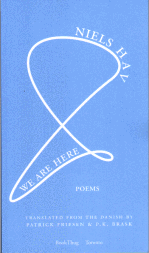 Niels Hav
Niels Hav
translated by Patrick Friesen and P. K. Brask
BookThug ($15)
by Poul Houe
Niels Hav (b. 1949) is an award-winning Danish poet, and We Are Here is a slim, respectably translated selection of his poems into English. With the bulk of its forty-five texts culled from a 2004 collection and the rest dating back to an earlier volume of lyric poetry, it probably represents the author at his mildly quirky and wryly humorous best. The outlook is sympathetic throughout, stressing truth-saying, reality checks, and heartfelt no-nonsense goals for the laborer in Poetry’s vineyard.
Every so often Hav’s licentia poetica succumbs to a thinly veiled message delivery, with the messages approaching predictable locker-room philosophies of life. Lamentations over the noisy blabbering filling our present world in “Fools” appear next to celebrations of hope defeating “incarnations / of human evil” in “Axiom,” and titles such as “Becoming a Grownup” intimate wisdoms too conventional for any poem’s aesthetic good. “If you are certain of something / you can take for granted that you’re wrong,” according to the poem “Problems.” You don’t say! In “All Religions Are Hypotheses” we are likewise told that “what matters” is to face the music, although it may be deadening; we mustn’t answer the hopes of children with cynicism and resignation.
When, on the other hand, Hav leaves didactic and discursive objectives aside, his poetic voice makes a worthwhile sense of its own. The poet’s “November Visit” to his dying father in the hospital, and an earlier “Visit from My Father” to the lyric ego in his home, unveil a prosaic harshness and sparseness on the old man’s part that is nothing short of gripping. Two shorter poems about love of a different kind reach their climax more directly: in “A Terrible Happiness,” love becomes a catastrophic ambulance ride, and in “Double Exposure” we find the tender:
You were in my thoughts
when I lay awake
unable to sleep.Then I fell asleep
and you were there, too.
Several poems insisting on realism avoid the pitfall of poetic correctness by incorporating an awareness of the poetic métier. In “Nonsense Detector,” dialect proves immune to “pathetic nonsense” and deception, so “it would probably be useful / to translate some new poems into dialect.” Calling a “spade a shovel” in this verbal mode would not work for long, for “most people who speak a dialect / have held one in their hands.” Still, a poem directly titled “Dialect” points to the limits of dialectic truths and cautions against the “self-delusion” of seeing “yourself as a victim.”
Even a truly realistic code can thus be overly restricted, and “to notice what’s going on, and if possible / to say things as they are” (“The Task”) may be admirable but difficult. “Unable to Come Up with an Answer” articulates the temptation to escape from facts, reality and truth; “Everything is a lie / just as in reality,” as a typical line in “Café Pushkin” reads, and so “To write is an utterly futile / activity, it’s true” (“Words on Paper”).
Writing’s ultimate challenge is a self that is a house divided (“Human Mentality”). Hence, “In Defense of Poets” we read that “Poetry is a horrible disease … a tyrant … a pest.” Even “Silence / leads us astray in a psychic labyrinth” (“Aphasia”) as it becomes the language of haughty withdrawal into solipsism (“Say Something”), celebration of “Bitterness,” or self-indulgent victimhood. In one of Hav’s better, if not bitter, ironic twists, the coda posits: “Self-praise is usually genuine” (“Lodge Brothers”).
In a few poems with allusions to Liszt and the Schumanns, Hav may be paying tribute to his pianist spouse, whereas his final two short poems wrap up deeper concerns in a self-deprecating manner. In “Heart Problems” death is the subject of tomfoolery, and “There’s no shame / in dying on the floor, / as long as it’s not / on purpose.” But the final “Epigram” reads like a regular epitaph for this writer’s Dead Poet’s Club, as his lyric subject is seen like a “wretched fish / wrapped in Hungarian newspapers. / For one thing it is dead, / for another it doesn’t understand / Hungarian.” Quite a lively image of a deadly serious undertaking and its humorous Danish undertaker.
Click here to purchase this book at your local independent bookstore

Rain Taxi Online Edition, Fall 2007 | © Rain Taxi, Inc. 2007
